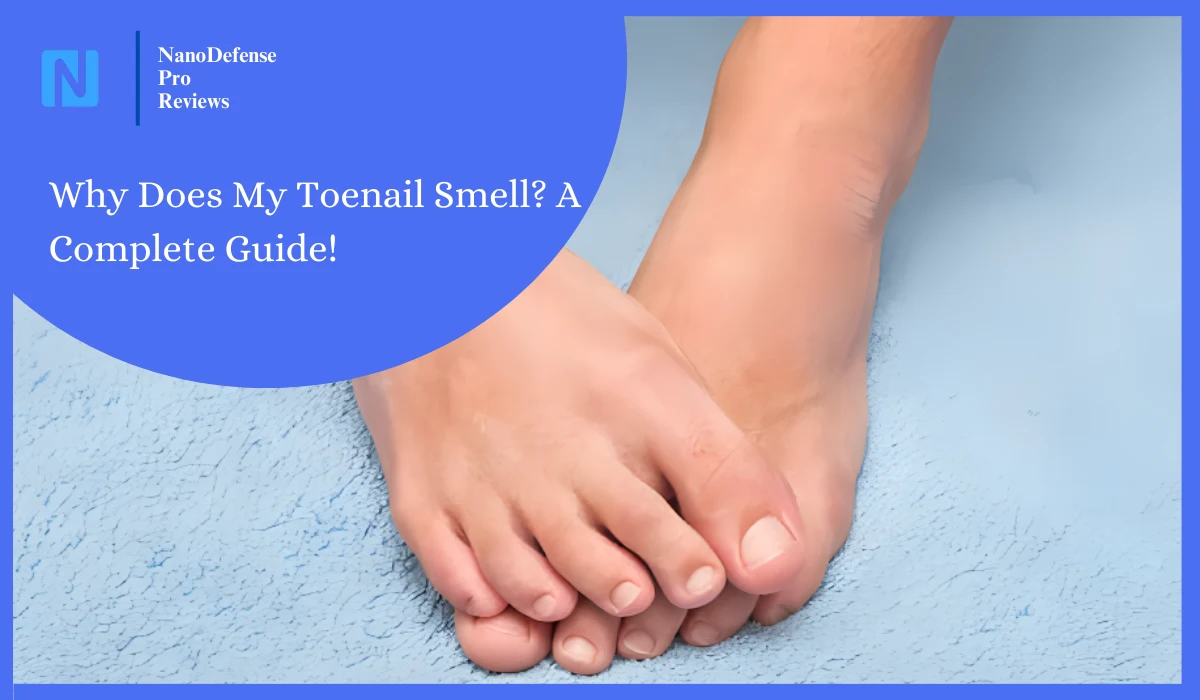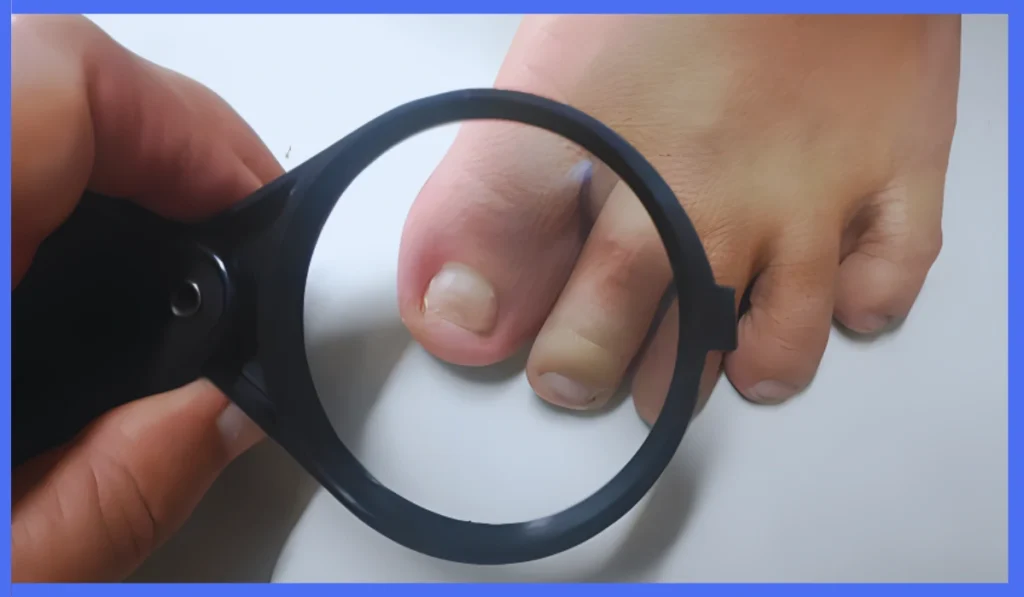Why Does My Toenail Smell? A Complete Guide!
Have you ever caught a whiff of an unpleasant odor emanating from your toes? It’s an awkward situation that many of us have experienced, and it can be both baffling and concerning. Smelly toenails are not just an embarrassing nuisance; they can also be a sign of an underlying health issue. Understanding the causes of…

Disclaimer: This article has been generated with the assistance of AI tools. While our research team has fact-checked the content, readers should independently verify information for accuracy and reliability.
Have you ever caught a whiff of an unpleasant odor emanating from your toes? It’s an awkward situation that many of us have experienced, and it can be both baffling and concerning. Smelly toenails are not just an embarrassing nuisance; they can also be a sign of an underlying health issue. Understanding the causes of this common problem is crucial for maintaining good foot hygiene and addressing any potential medical concerns.
Anatomy of a Toenail

Before delving into the reasons behind smelly toenails, it’s essential to understand the structure and function of these tiny keratin shields. Toenails are composed primarily of keratin, a protein that forms the nail plate. This protective layer covers and safeguards the tips of our toes, supporting the surrounding tissues and preventing injury.
Toenails grow slowly, with new nail cells forming at the base and pushing the older ones forward. As the nail grows, it also thickens, providing additional protection for the toes. However, when this natural process is disrupted, it can lead to various toenail problems, including unpleasant odors.
Common Causes of Smelly Toenails
Fungal Infections
One of the most common culprits behind smelly toenails is fungal infections, also known as onychomycosis. These infections occur when fungi, such as dermatophytes, take up residence under the nail and thrive in a warm, moist environment. As the fungus grows, it can cause the nail to thicken, discolor, and become brittle, creating an ideal breeding ground for odor-causing bacteria.
Symptoms of toenail fungus include yellow, brown, or white discoloration, thickening of the nail, crumbling or brittleness, and a foul odor. Factors that contribute to the development of fungal infections include poor hygiene, excessive moisture, and a compromised immune system.
Bacterial Infections
Bacterial infections, such as paronychia, can also lead to smelly toenails. These infections occur when bacteria enter the skin around the nail, causing redness, swelling, and discharge. As the infection progresses, it can affect the nail and produce an unpleasant odor.
Symptoms of bacterial nail infections include redness, swelling, pain, and pus or discharge around the nail. Proper wound care and hygiene are crucial to prevent bacterial infections from taking hold.
Ingrown Toenails
Ingrown toenails can be another source of foul odors. When a toenail grows into the surrounding skin, it can create an entry point for bacteria and fungi, leading to infection and an unpleasant smell. Ingrown toenails are often caused by improper nail trimming, tight footwear, or trauma to the toe.
Symptoms of ingrown toenails include pain, redness, swelling, and sometimes, discharge or pus. To prevent and manage ingrown toenails, it’s important to practice proper nail-cutting techniques, wear comfortable shoes, and seek medical attention if the problem persists.
What does an infected toenail smell like?
An infected toenail typically emits a foul, cheese-like odor. This unpleasant smell is often caused by the breakdown of proteins and the release of volatile compounds by the fungi or bacteria involved in the infection. The odor can range from mild to overpowering, depending on the severity of the infection and the specific microorganisms present.
What kills toenail fungus permanently?
While there is no guaranteed permanent cure for toenail fungus, several treatment options can effectively eliminate the infection and prevent its recurrence. Topical antifungal medications, such as ointments or lacquers, can be applied directly to the affected nail to kill the fungus. For more severe cases, oral antifungal medications may be prescribed by a healthcare professional. In some instances, surgical removal of the infected nail may be necessary for complete resolution.
How to get rid of bad smell from toenails?
To get rid of bad smells from toenails, it’s essential to address the underlying cause. If the odor is caused by a fungal or bacterial infection, seeking medical treatment is crucial. Topical or oral antifungal medications and proper wound care can help eliminate the infection and the associated odor.
In addition to medical treatment, maintaining good foot hygiene is essential. Regularly washing and drying the feet, trimming toenails properly, and wearing clean, breathable socks and shoes can help reduce odor. Over-the-counter foot powders or sprays containing antifungal or antimicrobial ingredients may also help eliminate odor temporarily.
Lifestyle Factors and Hygiene Practices
While medical conditions like fungal and bacterial infections can contribute to smelly toenails, lifestyle factors, and hygiene practices also play a significant role. Poor foot hygiene can create an environment conducive to the growth of odor-causing bacteria and fungi.
Keeping feet clean and dry is crucial to prevent the development of unpleasant odors. Wash your feet regularly with soap and water, and dry them thoroughly, paying special attention to the areas between the toes. Wearing breathable socks and shoes can also help reduce moisture buildup and prevent odor.
Proper nail care is another essential aspect of maintaining foot hygiene. Regular trimming of toenails, avoiding nail polish for prolonged periods, and ensuring adequate ventilation for the toes can help reduce the risk of smelly toenails.
Seeking Professional Help
While some cases of smelly toenails can be managed with good hygiene practices, persistent or severe odors may require professional medical attention. Seeking the advice of a healthcare professional, such as a podiatrist or dermatologist, is crucial for an accurate diagnosis and appropriate treatment plan.
These specialists can identify the underlying cause of the odor, whether it’s a fungal infection, bacterial infection, or another condition, and recommend the most effective treatment options. In some cases, prescription medications, laser therapy, or surgical interventions may be necessary to resolve the issue.
It’s important to remember that foot and nail problems should not be a source of shame or embarrassment. Many people experience these issues, and seeking professional help is essential for maintaining overall foot health and preventing further complications.
Conclusion
Smelly toenails can be an unpleasant and potentially embarrassing problem, but understanding the underlying causes is the first step towards finding a solution. From fungal and bacterial infections to ingrown toenails and poor hygiene practices, various factors can contribute to this issue.
By maintaining good foot hygiene, practicing proper nail care, and seeking medical attention when necessary, you can effectively address smelly toenails and keep your feet healthy and odor-free. Remember, with the right approach and professional guidance, this common problem is often treatable, and there’s no need to suffer in silence.
Take proactive steps to care for your toenails, and don’t hesitate to consult a healthcare professional if you experience persistent odors or other concerning symptoms. By embracing a proactive mindset and seeking help when needed, you can bid farewell to smelly toenails and enjoy the confidence that comes with healthy, odor-free feet.

Lisa Miller
Dr. Lisa Miller is a board-certified Dermatologist with over 15 years of experience treating a wide range of skin, hair, and nail conditions. She received her medical degree from the prestigious Columbia University College of Physicians and Surgeons and completed her dermatology residency at the University of California, San Francisco, one of the top dermatology training programs in the country. Dr. Miller is an active member of the American Academy of Dermatology and has authored numerous peer-reviewed articles and book chapters on the latest advancements in dermatological care. She is frequently invited to speak at national and international medical conferences, sharing her expertise with other clinicians. In her private practice, Dr. Miller takes a patient-centered approach, collaborating closely with each individual to develop customized treatment plans. She is passionate about empowering her patients to achieve optimal skin, hair, and nail health through a combination of the latest medical therapies and lifestyle recommendations.
